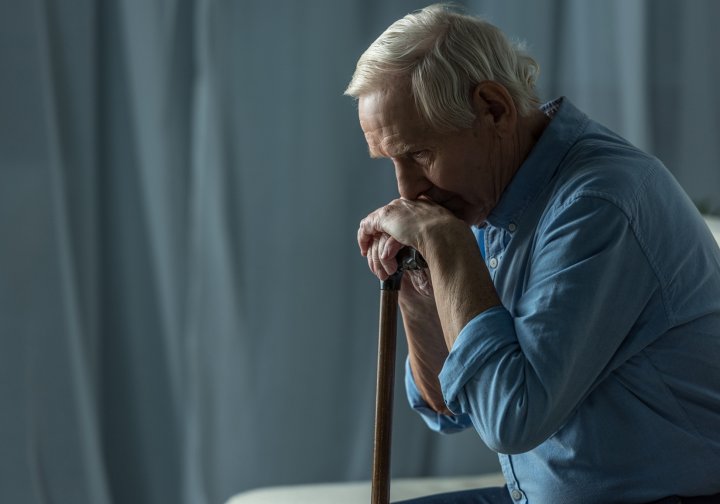Blog

Psychological problems faced by seniors
Old age is a natural part of life, but it brings with it very specific challenges, both physical and psychological. The psychological difficulties faced by seniors are often underestimated, ignored, or mistakenly considered a normal part of aging. Yet they have a significant impact on quality of life, health, and life expectancy.
We will introduce you to some of the difficulties that seniors most often have to deal with. We will also describe possible risk factors and advise you on how to combat these difficulties. So that you can support your loved ones or yourself.
Depression in old age
This is the most common psychiatric illness in seniors. It is often confused with dementia or attributed to natural slowing down.
Typical symptoms of depression:
-
loss of interest in previously enjoyed activities,
-
sleep disturbances, fatigue,
-
changes in appetite,
-
feelings of hopelessness, worthlessness,
-
memory impairment, indecisiveness.
Risk factors:
-
loneliness, loss of a partner,
-
chronic illness,
-
loss of autonomy (e.g., moving to a nursing home).
Options for help:
-
psychotherapy focused on supporting meaning and relationships,
-
medication (age-appropriate antidepressants),
-
activities that promote meaning and daily rhythm.
Anxiety disorders in seniors
Anxiety in old age is often related to concerns about one's own health, loss of self-sufficiency, or fear of death.
Common symptoms of anxiety:
-
excessive concern about health ("hypochondria"),
-
somatization, i.e., physical manifestations of anxiety (pain, tension),
-
restlessness, irritability,
-
avoidance of social situations.
Possible treatments:
-
cognitive behavioral therapy,
-
relaxation techniques,
-
raising awareness and explaining cycles of anxiety and fear,
-
sometimes medication (anxiolytics with caution).
Dementia and its psychological effects
Dementia is not just a memory problem, but is also accompanied by changes in personality, mood, and behavior.
Psychological problems associated with dementia:
-
depression, anxiety, irritability,
-
paranoid thoughts,
-
feelings of loss of identity and dignity.
Recommendations:
-
orientation work (calendar, photographs, familiar objects),
-
validation therapy, which does not refute feelings or judge, but rather accepts them, thereby increasing the value of the person,
-
support groups for caregivers,
-
the possibility of specialized centers (e.g., day care centers).
Loneliness and loss of meaning
Loneliness is a common and silent trigger of mental health problems. Loneliness is not just a lack of people around, but also a lack of deep relationships and a sense of importance to someone. Seniors find themselves in a period when they have lost their loved ones, family members, sometimes partners or friends. It is understandable that people may feel lonely, which unfortunately leads to subsequent mental health problems.
How it manifests itself:
-
withdrawal,
-
passivity, lethargy,
-
loss of motivation, lack of interest in surroundings.
How to help:
-
regular contact with loved ones,
-
volunteering, intergenerational activities,
-
involvement in community groups,
-
efforts to find new meaning in life, e.g., keeping a chronicle, passing on experiences to descendants, etc.
Reactions to loss (grief, adjustment disorders)
Old age brings many losses. These may not only be the loss of loved ones, but also deteriorating health, loss of employment, hobbies, and roles that people were accustomed to performing. Sometimes natural sadness turns into chronic grief or maladaptive reactions. A maladaptive reaction is defined as the inability or unwillingness to functionally adapt to changes, which brings relief in the short term but is ultimately harmful. Common patterns of maladaptive behavior include, for example, suppression of emotions, self-harm, overeating or outbursts of anger.
Signs of complicated grief:
-
constantly returning to the past,
-
loss of contact with reality,
-
rejection of a new life role.
Help:
-
sensitive psychotherapy focused on grief,
-
spiritual accompaniment,
-
gradual involvement in active life.
The mental health of seniors is a topic that definitely deserves more attention. Because age is no reason to give up on mental well-being. On the contrary, it brings a whole range of opportunities and challenges that can be taken advantage of.
A dignified old age means not only physical comfort, but also the opportunity to be heard, understood, and to feel important. If you know a senior citizen in your neighborhood who is withdrawn, sad, anxious, or confused, it may be a sign that they need help.
You too can improve the lives of those around you. Whether it's more frequent visits or phone calls to your loved ones, talking to your neighbors, or actively participating in intergenerational programs.
If you or someone you know is struggling with the above-mentioned difficulties, don't hesitate to contact us. Our experts will recommend the appropriate course of action for the situation.
Sources:
https://www.wikiskripta.eu/w/Psychick%C3%A9_poruchy_u_senior%C5%AF
https://zdravi.euro.cz/clanky/lecba-psychickych-poruch-ve-stari/
https://www.knihydaniela.cz/book-preview-4825.pdf
http://www.cspsychiatr.cz/detail.php?stat=1449
http://www.cspsychiatr.cz/detail.php?stat=1076
https://pavelrataj.cz/kafarna-2/kafarna-texty/maladaptivni-chovani/
